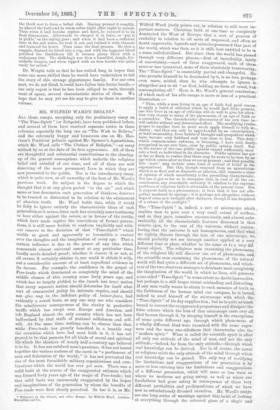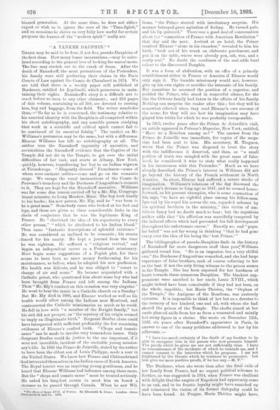MR. WILFRID WARD'S ESSAYS.* ALL these essays, excepting only the
preliminary essay on "The Time-Spirit" (or Zeitgeist), have been published before, and several of them have received separate notice in these columns, especially the long one on "The Wish to Believe," and the extremely happy and humorous one on Mr. Har- rison's Positivist polemic against Mr. Spencer's Agnosticism, which Mr. Ward calls "The Clothes of Religion,"---an essay noticed by us at the date of its first appearance. All of them are thoughtful and substantial contributions to the clearing. up of the general assumptions which underlie the religious belief and unbelief of our time, and all of them are well deserving of the more permanent form in which they are now presented to the public. Nor is the introductory essay, which is quite new, at all unworthy of the best of Mr. Ward's previous work. Its subject is the degree to which the thought that is at any given period "in the air," and which more or less dominates each generation of thinkers, deserves to be trusted or distrusted in its relation to the attainment of absolute truth. Mr. Ward bolds that, while it would be folly to ignore entirely the characteristic ideas of each generation as it arises, since each has certainly some testimony to bear either against the errors, or in favour of the truths, which have made captive the convictions of former genera- tions, it is still more foolish to conform implicitly and with. out reserve to the dictation of that " Time-Spirit " which wields so great and apparently so irresistible a control over the thoughts and the imagination of every age. That a certain influence is due to the power of any idea which commands almost universal assent at any particular time, hardly needs detailed proof; whether it deserve it or not, at all events it certainly obtains it, nor could it obtain it with. out a considerable amount of at least superficial evidence in its favour. For example, the confidence in the gospel of Free-trade which dominated so completely the mind of the middle classes of this country some forty years ago, and which has so largely yielded to the (much less true) notion that every separate nation should determine for itself what sort of commercial policy its interests require, and should not give way to the indolent policy of laisser-faire, had evidently a sound basis, as any one may see who considers the mischievous consequences of the rivalry in protective tariffs which has swept over Europe and America, and left England almost the only country which has not been half-ruined by that strife of national selfishness and self- will. At the same time, nothing can be clearer than that, while Free-trade has greatly benefited in a humble way the countries which have had most faith in it, it has not proved to be that panacea for all kinds of moral and spiritual ills which the thinkers of nearly half-a-century ago believed it to be. It has not subdued men's passions ; it has not bound together the various nations of the earth in "a parliament of mau and federation of the world ; " it has not prevented the rise of the most formidable military organisations and com- binations which the world has ever yet seen. There was a solid basis at the source of the exaggerated estimate which was formed forty years ago of the magic of Free-trade; but that solid basis was enormously exaggerated by the hopes and imaginations of the generation by whom the benefits of Free-trade were first clearly perceived. So too it is, as Mr.
* Witnesses to the Unseen, and other Essays. By Wilfrid Ward. London : Macmillan and 00.
Wilfrid Ward justly points out, in relation to still more im- portant matters. Christian faith at one time so completely dominated the West of Europe, that a sort of passion of credulity in relation to all sorts of unproved, and often no doubt improvable, legends and miracles possessed that part of the world, which was then, as it is still, best entitled to be in a sense called civilised. But since then the world has passed through very different phases,—first of incredulity, lately of uncertainty,—each of them exaggerated, each of them more or less tyrannical, none of them absolutely trustworthy. The " Time-Spirit" is essentially partial and changeful. He who permits himself to be dominated by it, is no less, perhaps even more, misled, than he who attempts to ignore it altogether and to sit "as God, holding no form of creed, but, contemplating all." Here is Mr. Ward's general conclusion, of which each of his able essays is more or less of a practical illustration :— "Thus, while a man living in an age of faith had good reason to apply a habit of criticism which he would find little general, one who lives in an age of criticism will do well to give his atten- tion very closely to many of the phenomena of an age of faith as a corrective. The characteristic discoveries of his own time he will imbibe without any determined effort. The modifying truths proper to another time he must needs apply himself to with in., dustry ; and they can only be apprehended by an emancipation, at least momentary, from habits of thought and sympathies which have become very habitual and very close to him. This duty,. which common-sense enforces, is becoming, I have said, dimly. recognised in our own time, even by public opinion itself. But in the nature of the case public opinion cannot sufficiently incul cate a task so individual in its character. Public opinion has got so far as dimly to realise that there may be more to be seen by an age which comes after us than we see at present ; and that possibly this 'more' may include some kind of revival of belief in the supernatural. But this, though removed from an agnosticism, which is as final and as dogmatic as atheism, still remains a state of opinion of which uncertainty is the prevailing characteristic. Nor has it got so far as to recognise that, in view of all the cir- cumstances, any reasonable certainty in relation to the supreme, problems of religious faith is attainable at the present time. But it respects faith as a phenomenon ; it feels that it has not alto- gether mastered its springs ; it is perhaps not altogether without hope of some new twilight after darkness, though it has despaired). of a return of the sunlight."
The " Time-Spirit " is, indeed, a sort of microscope which, enables men to pore over a very small extent of surface,- and as they gaze, transfers unconsciously, and almost auto- • matically, all the characteristic features discerned in that minute spot, to the rest of the universe, without remem- bering that the universe is not homogeneous, and that what we rightly discern through the lens of one microscope, we should probably not see through another applied at a very different time or place, whether to the same or to a very dif- ferent object. The religious man examining the phenomena of the religions life will discover one set of phenomena, and; the scientific man examining the phenomena of the natural world will find quite a different set of phenomena, and which- ever of the two observers manages to dominate most completely the imagination of the world in which he lives, will generate a one-sided" Time-Spirit" to some extent no doubt instructive, but perhaps to a still larger extent misleading and disturbing. If any man really wants to attain to such measure of truth as the feebleness of the human mind can compass, he is bound indeed to avail himself of the microscope with which the " Time-Spirit " of his day supplies him ; but he is quite as much bound to correct the exaggerated proportions and dissipate the false colours which the lens of that microscope casts over all. that he sees through it, by steeping himself in the conceptions of some quite different age, through which phenomena of a wholly different kind were examined with the same eager- ness and the same one-sidedness that characterise also the "modern spirit." What is called the scientific spirit is after all only one attitude of the mind of man, and not the only- attitude,—indeed, far from the only attitude,—through which real knowledge can be derived. Nor is, of course, the moral or religious spirit the only attitude of the mind through which real knowledge can be gained. The only way of rectifying the limitations and exaggerations of our generation is by more or less entering into the limitations and exaggerations of a different generation, which will more or less warn us where we moderns are going astray, as well as where our forefathers had gone astray in consequence of those very different partialities and predispositions of which we have now so ostentatiously divested ourselves. Mr. Ward's essays are one long series of warnings against this habit of looking at everything through the coloured glass of a single ands biassed generation. At the same time, be does not either expect or wish us to ignore the uses of the " Time.Spirit," and on occasions he shows us very fully how useful for certain purposes the lessons of the "modern spirit" really are.











































 Previous page
Previous page